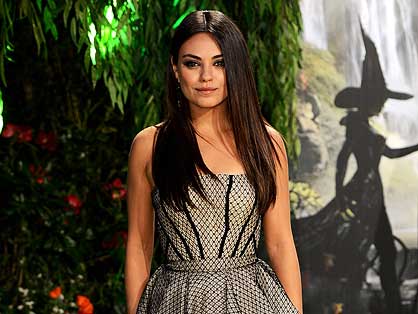
Mila Kunis’ stardom went up a notch last week, and you would think it’s because she stars in the biggest movie of the year so far.
But Oz the Great and Powerful, which debuted with US$79.1 million at the box office, had little to do with the sudden rush of adulation that engulfed Kunis.
Instead, it was a seven-minute viral video that’s been watched more than 10 million times and blogged about the world over.
The Great and Powerful isn’t Oz, but the Internet, which can burnish a star’s image just as it can destroy it.
The video, you’ve surely seen by now, is from a press junket interview for Oz with a young BBC radio personality, Chris Stark. Stark begins by announcing he’s “petrified” at doing such an interview for the first time.
But he’s obviously quite comfortable as his own version of Hugh Grant, charmingly peppering Kunis with questions about pub drinking, his local soccer club in Watford and a theoretical day out together. He expects to earn “massive lad points,” he says.
Kunis is exceptionally winning: She happily goes along, eager for a break from a day of monotonous TV interviews promoting the film. When Stark moves to return to more normal questions, she protests: “Why This is such a better conversation.”
The clip was roundly greeted online as proof of Kunis’ “awesomeness.” (Google “Mila Kunis is awesome” and you’ll get countless links rhapsodising about the interview.) New York Magazine’s Vulture blog hailed “a brand-new inductee into the most-adored-actress-ever club.”
What’s emerging is a new kind of stardom propelled by glimpses of authenticity circulated on the Web like evidence of a star’s real nature: guileless snapshots of their innate coolness.
Internet videos are known for elevating anonymous people to renown, but they can greatly enhance the reputations of the famous, too. Kunis went viral because the interview confirmed her image: She’s funny, sarcastic and game.
She banters just as well in real life as she does in the romantic comedies she stars in.
It was the same when, in 2011, Ryan Gosling was captured in a cell phone video on a New York City intersection helping to stop a fight in the street.
Ad Feedback
There was Gosling, wearing a baseball hat and carrying groceries, humbly playing the role of hero, just as he sometimes does in the movies. Stars aren’t just like us, we think; they’re just like their screen personas.
Jennifer Lawrence most recently experienced a similar surge after her best actress Oscar win. You would expect the award – a mountain peak for any actress – would have been the dominant conversation the next day about the 22-year-old Lawrence.
But more than the Academy Award, she was lauded online for her backstage demeanour. Facing reporters, she confessed to taking a shot beforehand, flashed the middle finger and laughed at herself for falling on the stairs on her way to the stage. She was perfectly self-deprecating and unpolished.
Millions watched videos of her backstage, and more than 5 million viewed an ABC News interview with Lawrence from later than evening.
It captured Lawrence’s astonished reaction when Jack Nicholson introduced himself to her. A Lawrence mythology was in full flourish.
Another Oscar-winner, the director Ang Lee, was captured after the Academy Awards in an Instagram photo.
The tuxedo-clad director of Life of Pi was candidly spied clutching his statuette in one hand, and chomping on an In-N-Out burger in the other. Vanity Fair declared “Even housing an In-N-Out Burger is adorable when Ang Lee does it.”
Seemingly candid moments have long been manufactured for good publicity, and it’s likely some stars will try to take advantage with their own fake Zapruder-like videos.
And for every genuine video that stokes a star’s image, there are dozens of embarrassing cell phone clips and TMZ “gotcha” moments that make most celebrities more cautious.
Becoming a meme holds a lot more risk than reward. Certainly, Tom Cruise would rather certain Scientology videos hadn’t hit the Internet.
It’s unlikely Angelina Jolie was pleased her right leg became a star in its own right after the 2011 Oscars.
Alec Baldwin detested that private phone messages from him to his daughter leaked online. (Charlie Sheen appeared to love every bit of his “Winning,” but few stars desire the same kind of publicity.)
Even Gosling, who also became a meme that flaunted his sensitivity with photo captions beginning “Hey Girl,” is ambivalent about the Internet.
In a recent interview, he said the experience of the street video made him hesitant to get involved, “even if it’s the right thing to do.”
“The Internet has just become a bit of a minefield,” he said. “I try not to go in there. It’s funny, I think about that time Fabio was on a rollercoaster and got hit in the face with a pigeon. I think about that a lot. I feel like that pigeon. I’m the pigeon and the Internet is Fabio’s face.”
– AP